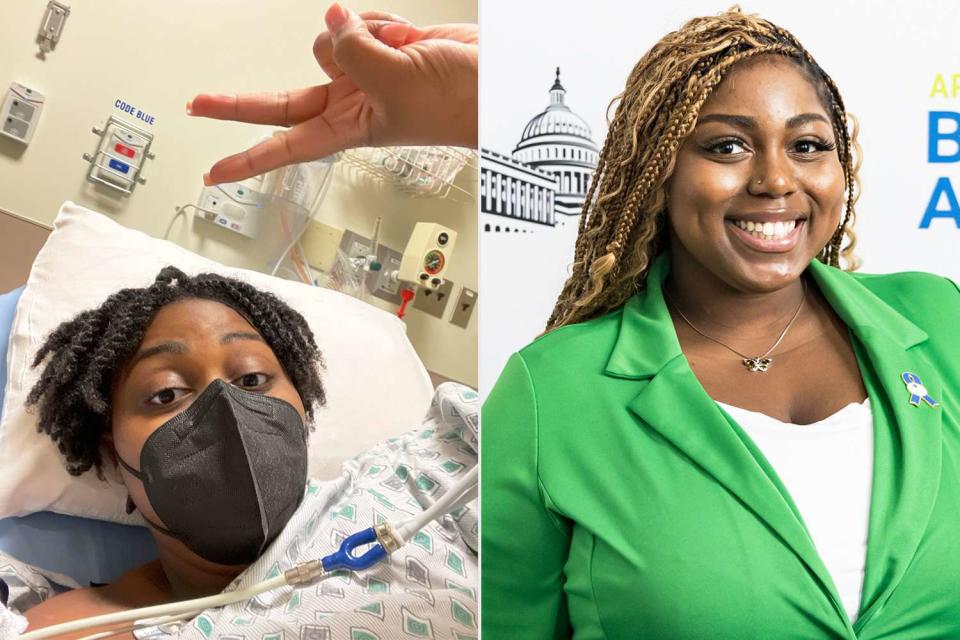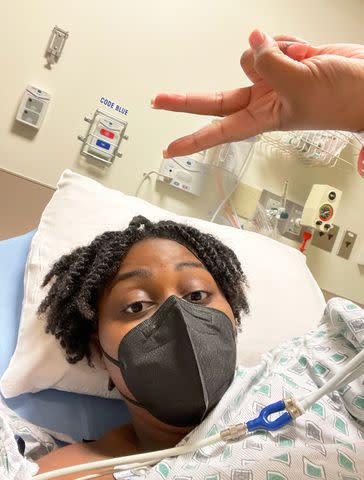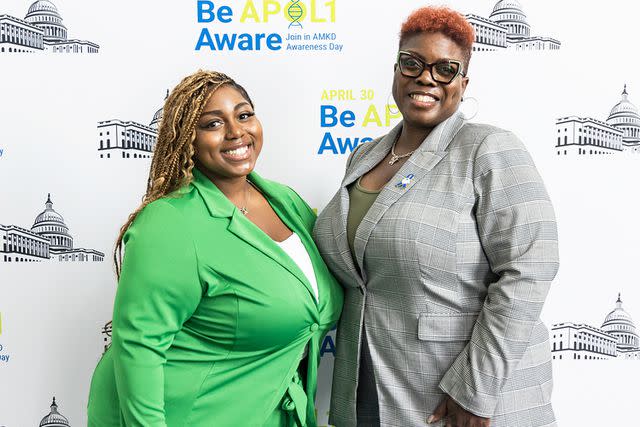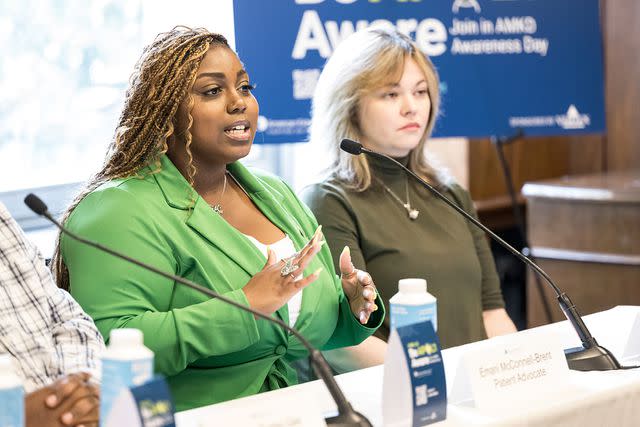Woman, 20, Recalls 'Morbid' Kidney Disease Disrupting Her Life: 'I Couldn't Be a Normal Teenager' (Exclusive)
Emani McConnell-Brent, 20, opens up to PEOPLE about being diagnosed with a genetic kidney disease and marking the nation's first AMKD Awareness Day

Courtesy of Emani McConnell-Brent; Courtesy of the American Kidney Fund
Emani McConnell-BrentEmani McConnell-Brent was in the first week of her senior year of high school when she went to the emergency room with debilitating stomach pain.
It wouldn't be until a year later that the teen learned she had APOL1-mediated kidney disease (AMKD), a rare and rapidly progressing kidney disease that would change her life. Now 20 years old, she is opening up to PEOPLE about her health journey in honor of the nation's first AMKD Awareness Day.
While hospitalized for her stomach pain in September 2020, McConnell-Brent, from Prince George's County, Maryland, had bloodwork and a urinalysis done to determine the cause of her symptoms.
“When my urinalysis came back, my ER doctor was like, ‘This is a weird amount of protein in your urine. You're not supposed to have any at all,’” she tells PEOPLE. “So they told me that I had to do a 24-hour urinalysis, and when that came back, the doctor was like, ‘Okay, something's wrong here for sure.’”
McConnell-Brent then had a biopsy done and was told she had nephrotic syndrome, a chronic kidney disorder, and doctors wanted to do more research. Months later in early 2021, she was diagnosed with focal segmental glomerulosclerosis (FSGS).
FSGS is a serious and rare type of kidney disease that causes scarring in the filters of the kidneys, according to the American Kidney Fund. It can make it hard for the kidneys to filter waste, which can lead to kidney failure.
“It was very morbid,” McConnell-Brent says of her diagnosis, sharing that she even started therapy to cope with it. “I thought I was going to die. It was my senior year of high school, everyone's excited and planning for their future and I realized if I'm sick, I can't go away to college. I was scared and for a while I was really depressed. I was anxious about every little thing.”

Courtesy of Emani McConnell-Brent
Emani McConnell-BrentRelated: Olympic Gymnast Suni Lee Opens Up About Being Diagnosed with Incurable Kidney Disease
She continues, “And then my mom told me, ‘Okay, are we going to live through it or are we not? You have to make that decision.’ And I was like, ‘Well, I don't want to die. I just think I am.’ And so I made the decision that I'm going to live through it.”
McConnell-Brent’s nephrologist put her on a number of medications to treat her symptoms: swelling, weight gain and fluid in her legs.
However, the medications weren’t working, even after several months.
“It was very frustrating. I couldn’t be 18. I couldn't be a normal teenager,” she admits. “It’s frustrating because you're doing your best to push through, you're being optimistic, you have a support system around you, but it feels like you're at a standstill.”
After three failed medications nearly a year after her FSGS diagnosis, McConnell-Brent was urged by her doctor to get genetic testing done, which led to her being diagnosed with AMKD, a severe kidney disease caused by a genetic variation of the APOL1 gene.
She admits that the news surprisingly left her feeling relieved.
“When I got the first diagnosis, I thought it was my fault,” she explains. “I thought, ‘What did I do? Was I unhealthy? Maybe it is my fault because I'm obese.’ So when they told me I had the APOL-1 gene, I was excited like, oh my God yes, finally there's something to stand on. It wasn't something that I did to make myself sick. It’s in my genes.”

Courtesy of the American Kidney Fund
But after the excitement, McConnell-Brent says she’s started feeling “a lot of resentment” toward her doctors in the past because her disease could’ve been diagnosed much earlier in life.
“The truth is, I always had a lot of protein in my urine but they had just said, ‘You're obese, eat healthier, be active, and it'll go away,’” she says. “I feel like when signs like that are displayed, it should put physicians on alert to just check and see if it's something more than they think it is. Genetic testing should happen in any sense of uncertainty.”
A year after her diagnosis, McConnell-Brent decided to share her health journey on Instagram, tagging the American Kidney Fund, which she credits with helping her learn about her disease.
“I didn't die. And I need people to know that if you're diagnosed with this — it doesn't matter how old you are, if you feel like life is just beginning — it doesn't mean that it's the end. It just means that life is going to look a little different,” she explains.
Never miss a story — sign up for PEOPLE's free daily newsletter to stay up-to-date on the best of what PEOPLE has to offer, from celebrity news to compelling human interest stories.

Courtesy of the American Kidney Fund
Emani McConnell-BrentToday, McConnell-Brent — executive assistant in Prince George's County Council and a full-time college student — is now taking a medication she’s “optimistic” about as she continues to manage her disease.
She has also partnered with the American Kidney Fund and is using her platform to help others going through similar battles.
“I didn't see anyone who had experienced what I did,” she says of becoming an advocate. “I don't want anyone else to feel the way that I felt. I felt alone and I was scared and I needed people to know that you're not the only one. There's a group of us who are dealing with the same thing, but if we stay silent, no one will know that we're here for them.”
Additionally, McConnell-Brent tells PEOPLE that she set a goal last year to “make APOL-1 famous,” and she’s done just that. Alongside the American Kidney Fund, she is announcing that April 30 will mark the nation’s first AMKD Awareness Day.
“I hope people learn what AMKD and the APOL-1 gene is. I hope it raises awareness to physicians especially with encouraging genetic testing because I feel like if there are resources for people to learn what’s happening with their body, there will be less kidney failure, there will be less dialysis patients. It doesn’t have to be that way,” she says. “I also want patients like me to make sure that they are proactive and take care of themselves.”
For more People news, make sure to sign up for our newsletter!
Read the original article on People.

